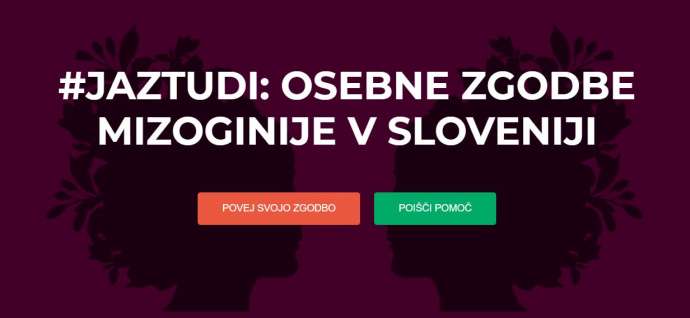STA, 25 December 2019 - Almost two years after a feminist NGO launched #jaztudi, the Slovenian version of the #metoo campaign, the rate with which victims are sharing their stories has come to a steady trickle. Nevertheless, the campaign has left an indelible mark in society. Not only has it raised awareness about consent and inequality, it has spurred legislative change.
Nika Kovač, the president of March 8 Institute, which launched the campaign in March 2018, believes that the campaign broached broader issues of gender inequality. "I feel that addressing issues of gender inequality raised awareness [about inequality] in general."
A vital shift has taken place, Kovač said. "It has become clear that sexual violence and harassment are pervasive in our society, albeit often unseen," and the campaign created room to address sexual violence in a better and fairer way.
The testimonies reflect the normalisation of sexual harassment in society to the extent that victims feel like they are being overly sensitive for sharing their stories, says Kovač.
Many seem to downplay the severity of what they had suffered, as if sexual violence were normal, something not important enough to be raised to attention, although it was one of the most horrifying experiences of their lives.
In January 2018, the NGO launched a petition demanding a redefinition of rape in the penal code. The effort came as a response to a court case in which a man was acquitted of rape because the victim was asleep and unable to resist (with more details here).
More than 5,000 people signed the petition demanding that rape no longer be defined as a sexual act perpetrated by force but a sexual act perpetrated without consent.
"In response to the ruling ... the expert public, politicians and civil society joined forces in a wish to change unjust criminal legislation."
"The Ministry of Justice decided to redefine rape, I believe this is one of the biggest changes for the better made by the #jaztudi campaign," said Kovač.
Justice Minister Andreja Katič said at a debate on violence against women in late November that she wanted the penal code to change so as to penalise any sexual act without clear consent of both partners. The ministry is yet to present a draft of the legal changes.
Kovač said that the NGO was reserved about #metoo at first because of the sensationalism it caused in the US, where #metoo largely became a part of pop culture mainstream and failed to show different perspectives.
What is more, "in Slovenia, the [global] #metoo campaign did not trigger a spontaneous response it got in many countries around the world."
The March 8 Institute therefore decided to take a different approach and collect and post anonymous stories online, which are available at www.jaztudi.si. Victims can share their stories through the website, which also provides helpful links.
The response surpassed the NGO's expectations. It received more than 150 stories, and more are still coming in, albeit at a slower pace.
The stories collected show that sexual harassment often takes place in places that should be safe, like at home, at school, at the doctor's office.
Very often, the abusers are people close to the victim, people in position of power, coaches, teachers, superiors. "Testimonies also reveal that other people, who know what is happening, remain silent, dismissing or ignoring the problem."
Most of the victims who shared their stories were women, nine of them (6%) were men and one transsexual. 51.3% of the victims were abused as minors.
"The testimonies highlight the structure, the workings of a society that enables and reproduces sexual violence and harassment," said Kovač.
In the face of rising populism, members of the NGO have faced threats, but that comes with the territory, says Kovač, adding also that the campaign had not received negative press from mainstream media.






